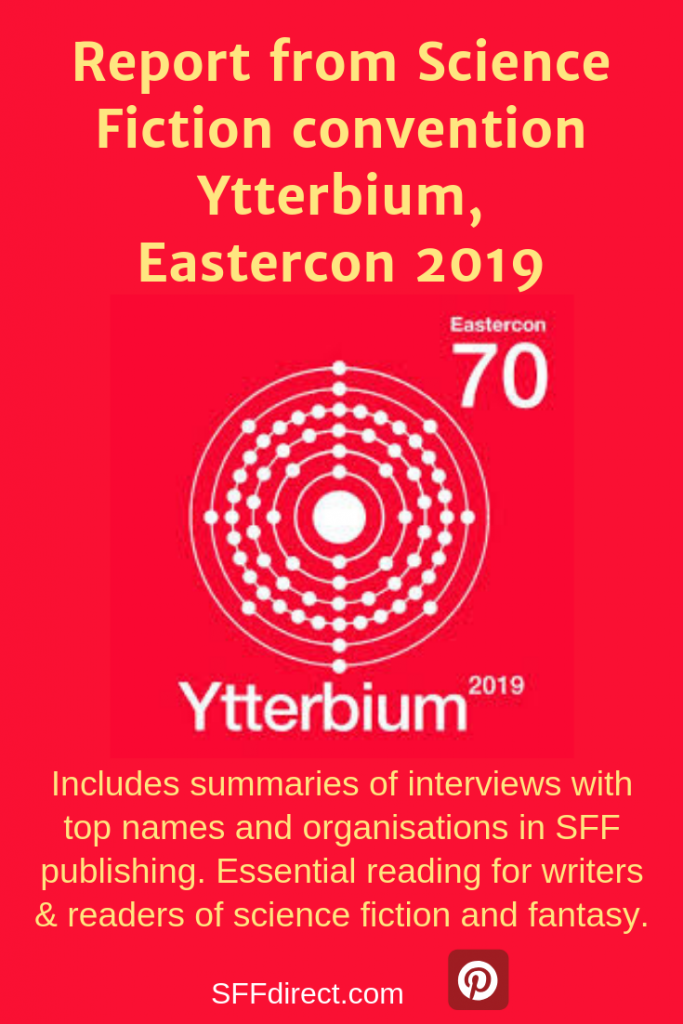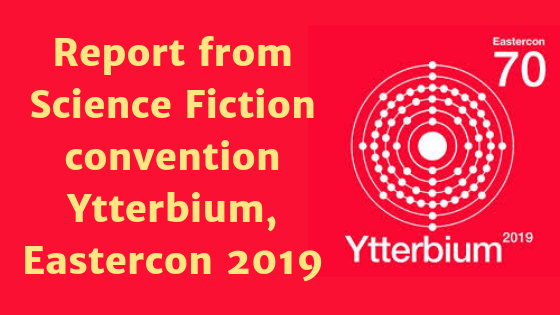Of all the UK science fiction and fantasy (SFF) conventions, Eastercon is probably the jewel in the crown. Taking place every year over the Easter weekend, it offers four days of SFF immersion and geekery like no other. It is closely related to the BSFA and is billed as a science fiction (SF) con but really it covers the whole breadth of SFF, and even horror (H) too. This year is the 70th Eastercon; every Eastercon is given a different name and this time it is ‘Ytterbium‘ after the 70th element of the periodic table. The cons are completely volunteer-run and groups of people bid to lead it in following years. Consequently each year is headed up by a different group of people.
I carried out a number of interviews. They’re summarised below and it’s unmissable reading for anyone writing and submitting SFF or anyone even thinking of doing that. You can jump to the different sections of this report by clicking on the contents items below.
This report contains:
My purposes for attending
Initial impressions
Summaries of the interviews I carried out:
-
Roy Gray from TTA Press (Interzone/Black Static)
-
Lee Harris from Tor.com Publishing
-
Ian Whates from NewCon Press
-
Noel Chidwick from Shoreline of Infinity
Conclusions from the panels and workshops, and other chats
Purposes for attending
This year was my first Eastercon – yes my First Eastercon! I’ve attended other cons (principally NineWorlds, NovaCon and FantasyCon) but never this one. Like a lot of SFF fans, I sometimes find it difficult to talk to people so I approached the convention with trepidation. As I discovered, I needn’t have; I had the best time. I attended with a few purposes in mind:
- Speak to as many people involved in publishing SFF as possible. (I am a science fiction writer studying an MA in Creative Writing and the current module is ‘Writing as a Profession’.)
- Raise awareness about this website.
- Meet people and network.
- Find out what’s current in SFF at the moment.
- Enjoy myself and pace myself. (I have CFS/ME and at previous cons I’ve found it hard pacing myself and making myself rest.)
In summary, I think I did well on all points except number 2. I’m not good at self-promotion so I didn’t tell anyone I talked to about my website, but over the weekend I did wear a T-Shirt I’d had printed with SFFdirect’s details. You can see it below!


Initial impressions
When I first arrived at the con I was disappointed for two reasons. One was that there didn’t seem to be as many panel talks for writers as I’d have liked. Some talks I really wanted to see were scheduled for Monday when I wouldn’t be there (I could only attend from Friday to Sunday). The second was that programme items I’d asked to lead weren’t anywhere on the programme even though I’d been assured they would be. These were welcome/support sessions on Saturday and Sunday for those with disabilities, those who have difficulties talking to others, or anyone just there on their own.
As it happened, neither of these issues were a problem. The first issue made me talk to people and not hide in panels, and it gave me opportunity to rest, so it turned out to be a good thing. With respect to the second, I emailed Farah Mendelsohn about the nonexistent support sessions and she got them put on the programme immediately and communicated by Twitter and the con’s newsletter, The Daily Drone.
The sessions took place on Saturday and Sunday from 9-10 a.m. in a quiet room at the con. The Saturday one wasn’t well attended as people didn’t find about about it soon enough really, but the Sunday one was well attended and I had a lovely time chatting to people. I’m so pleased it went well because it’s difficult attending a convention when you don’t know people and can’t take part in all the social activities. I wanted to prevent anyone else feeling lost or unsupported.
What I learned from interviews
I chatted to a number of people while I was at the convention, some of which were semi-formal interviews to research publishing in the SFF genre. I’ll summarise what I learnt because it’s useful information for other writers, and it’s interesting for readers and fans of the genre. I’ll discuss them in the order I carried out the interviews.
Roy Gray from TTA Press (Interzone & Black Static)
The attendee from TTA Press was Roy Gray; I arranged the interview with him in advance of the convention. He writes science fiction himself, although not so much nowadays. His role at TTA Press is to attend conventions and other events in order to sell the magazines and maintain their visibility and profile. This year he’ll be at Eastercon, EdgeLit, Dublin WorldCon, FantasyCon and SlEdgeLit.
The Editor of the magazines is Andy Cox. Roy said that Andy reads all the submissions for both magazines but has backup readers if he requires them. I must say that every time I’ve submitted to Interzone, I’ve had a very swift response – the longest was only nine days. Roy recommended looking at the Interzone facebook page so I’m going to check it out. Roy stated that Interzone receives 3000 submissions per year but the magazine can only take 100 of them. That’s sobering statistics but don’t let it put you off. Perseverance is key in the short fiction game.
Lee Harris from Tor.com Publishing
I was very lucky and honoured to get an interview with Lee Harris, Senior Editor at Tor.com Publishing. Like Roy’s interview, I arranged this one in advance of the convention. Lee was extremely busy and only able to attend the convention for a few hours so I’m doubly grateful he took the time to speak to me.
Company arrangement
First of all, Lee clarified the arrangement of companies. Under the parent company Tom Doherty Associates, there is Tor.com the online blog/webzine, there is Tor.com Publishing, and there is Tor Books US and Tor Books UK. There is little contact between Tor Books US and Tor Books UK. There is some contact between Tor.com Publishing and Tor Books US. And as I understand it, Tor.com the blog/webzine does its own thing.
Lee’s role
On the Tor.com Publishing website, it says that Lee deals with novellas, but Lee stated that he deals with novels too. His role is about finding books to publish. He reads submissions and chooses which of them to put before his team to decide whether to publish them or not. He manages one Editor and one Assistant Editor. Only about 10% of his time is spent actually editing manuscripts. He has about 15 – 20 authors who he looks after and last year he published 10 authors (not every author publishes every year). When he puts a book before his team to decide whether to take them on he has to prepare a profit and loss spreadsheet for them, but he says profit isn’t everything. If there is a book he considers important then that could override profitability.
Submissions
With respect to submissions, most of the time agents approach Tor.com Publishing or Tor.com Publishing approaches authors. For example, Tor.com Publishing approached Becky Chambers and bought 2 novellas from her, which will be coming out in 2021. However, there is an open submission window for 2 – 4 weeks each year where writers can submit their novellas and novels without an agent.
I asked what Lee looks for in a manuscript. He said the voice, an appealing style, but most importantly strength of character. He must care about the characters.
The state of the genre
I asked if his role requires a grounding in the SFF classics. He said no, it’s more important to be aware of what’s going on currently in the genre. I therefore asked what is going on in the genre. He said we’re seeing a real swing toward left wing politics in the genre. We’re seeing a lot of social science fiction coming through. He commented that any fiction done well reflects our world and perhaps this trend is a response to current politics. Lee said that within the last five years there is a lot more overtly political literature. I asked if Tor.com Publishing might shy away from publishing overtly political literature and he said no, they don’t shy away from anything. He said Tor.com Publishing is pretty left wing anyway.
Tor.com Publishing’s range
I asked about the range of SFF that Tor.com Publishing might publish. Lee said that they pretty much publish everything although they don’t really do epic fantasy because Tor Books are the masters of that. They don’t do much military SF either. Lee said that everything they publish is SFF to some degree; this could be a great degree or a small one.
Lee said they’ve got a new horror imprint coming out and it will be called Nightfire.
Ian Whates from NewCon Press
Ian started NewCon Press 13 years ago. Apart from PS Publishing they are the biggest SFF independent press in the UK. Ian runs the company himself with assistance from his wife. The imprint started with an anthology at a time when no-one was doing anthologies. There was concern that the short story was dying. It wasn’t – It was just evolving and moving online.
NewCon Press has become very successful. This year they will be releasing 24 titles, although Ian said that ideally he’d like to do 9 – 10 per year. NewCon Press only does SFF titles and a little horror but they do all types of length and structure. For example, they have begun releasing themed boxsets of novellas, often four titles to a box. Of the 24 titles released this year there are 5 anthologies, 4 collections, 8 novellas and the rest are novels.
Ian’s role
Ian spends his time doing tasks such as contracts, line edits, organising and choosing covers, and layout of content. He has someone else to do headers/footers and the final typesetting.
Ian doesn’t take out advertisements as they don’t work. He in fact does very little promotion, relying instead on attending the bigger conventions and on mailing lists to spread the word. Most sales are through the website, presumably through word of mouth. He does a mailing every month containing, for example, new titles. I asked what he enjoys most about running the company and he said it is the people. The SFF crowd are great people. And he enjoys finding new voices.
Route to print
Ian said that in the early days, with the anthologies, he would approach authors. Now they approach him all the time; or he might publish someone’s short story and they come back and say they’ve got a novel or a novella and he’ll publish that too. He now has to turn stories away as he has too many offers than he can publish.
NewCon Press is known for publishing the top well-known authors. I asked Ian if/how he publishes new unknown writers and he said that he wouldn’t publish a novella or novel from an unknown. Ian said he would ask to see a short story first and would publish them in an anthology alongside a big name and hopefully their name would be noticed and their profile increase and he could then publish a bigger work.
Company style
I asked Ian what style the company publishes. He said he publishes what he likes to read. If he reads it, likes it and would pay for it then it stands a good chance of being accepted.
Writer pitfalls
I asked Ian about the mistakes he sees writers making. He said most novelists overwrite. Nowadays many people go straight into writing a novel without writing short stories first, and they haven’t learnt to be concise. You have to keep narrative pace going. Other common mistakes are writers who think they’re the bees knees and are reluctant to edit. You have to be able to take direction.
The future
Ian wants to explore the audio side of things and he’s looking to do ebook formats. He’d like someone to do meta data and Kindle Direct Publishing for him. He also wants to reduce the number of titles per year.
Noel Chidwick from Shoreline of Infinity
Noel founded the Shoreline of Infinity magazine in 2014 with his co-founder Mark Toner. Noel is Editor-in-Chief and his remit is the fiction while Mark’s is the artwork. Each story gets a piece of bespoke art.
The company is based in Scotland and they are hoping to build the audience there and around the world. They do print and e-versions of the magazine and last year won the British Fantasy Society Award for Best magazine! About six weeks ago they started doing podcasts and have had over 500 listens in total already. The magazine also does SF events in the form of Event Horizon. These are evenings of readings, poetry, dramas and author talks. It’s once a month at an Edinburgh venue and it’s free entry.
Noel has experience in magazines from when he was 17 to his early twenties but nothing recent. However, he’s taken to it like a duck to water, with his experience in computing and graphic design helping a lot. He says he started the magazine because when his children grew up and left home he was at a loose end. He wants to encourage new writers.
Getting the word out
Noel doesn’t take out advertisements. He tried it but they weren’t successful. The best promotion is word of mouth. Twitter is also a real help, and the mailing list is a great resource too. People can subscribe to the website. Noel does the larger conventions – Eastercons and FantasyCon, and this year there is a new SF convention for Scotland called Cymera, which Noel helped to initiate and organise. Noel said that for him, conventions are more about networking and visibility than sales.
Submissions
Originally, the magazine was open to submissions all the time but it was overwhelmed with submissions. Consequently, they now have two windows per year of about two months each. In the January/February window this year they received 450 submissions and could only accept 10.
Shoreline of Infinity has a team of 6 people reading submissions and each story is seen by at least two sets of eyes. Then Noel gives it a final pass. I asked how he chooses if a story is a runner or non-runner. He said that if there is a typo in the first paragraph or other obvious error then it is rejected. It must be well-written. If he gets to the end of the first page then it’s definitely in the running.
With such volume of submissions, Noel must must have to reject some very good stories. I asked him how he separates the very good from those he actually publishes. He said the stories which get accepted start straight away. The first paragraph, the first sentence, must grab you and set a question and hook the reader. There’s no time to set the scene in a short story. The writing must be good enough that you’re there in the story. If there’s a sentence or paragraph that brings you out then it’s a non-runner. If you get to the end of it and you’ve been absorbed all the way through then it’s a winner. And he said that no matter how good the concept is, a story still needs excellent characterisation.
Style
Most stories in the magazine are soft SF. There’s not a lot of spaceships and rayguns. However, Noel said that faster-than-light travel and Star-Trek-like artificial gravity are acceptable for his magazine. The magazine’s tagline is ‘Reality with a twist of lemon’. He likes stories that look at society from a different perspective, perhaps tweaking just one aspect of society and seeing the ripples from it.
Best and worst
I asked Noel what’s the best thing about running an SF magazine. He said categorically that it’s the people he’s met along the way. It makes it all worthwhile. He loves the live events.
I also asked what’s the hardest thing about running an SF magazine. He said it’s the time it takes up. To do the role to a high standard of quality takes a lot of time and it takes him away from his wife and family.
Conclusions from the panel talks and workshops, and other chats
In addition to the more formal interviews I’ve summarised above, I spoke to many other people about publishing and the SFF genre. This included dealers such as Stairwell Books, Guardbridge Books, and Angry Robots; and con attendees, with fans and writers among them.
I didn’t attend many panels but the best one in my opinion was ‘Creating Fantastic Biologies’.
I attended one workshop-type item called ‘Mini Masterclass in Science Fiction Criticism with Tony Keen’. It was in two sessions and was essentially Tony Keen advertising the SF criticism weekend coming up in 2020, run by the Science Fiction Foundation. I was interested to hear about the weekend and I will probably go to it, but it wasn’t necessary to plug it so much. That said, I did read two excellent classic SF stories as a result of these sessions so that’s good. Here’s the Science Fiction Foundation website, and here’s their Facebook page.
Summation
So that’s about it! I had a great time even though I took regular breaks to rest in my hotel room and I was in bed at 8.15 pm on Friday and 9 pm on Saturday! I’d like to thank everyone who gave me an interview. They were all incredibly kind and accommodating and I was genuinely touched by how friendly and welcoming everyone was.
Please comment below. If you went to the con tell me what it was like for you. If not, I still want to hear from you and I’ll answer any question.



Thank you so much, but just to note that Eastercons are not the BSFA official conventions.
Eastercons are each one independent entities that agree to support the next independent entities in the series. They are a truly astonishing sequence of informal co-operative endeavours. 70 so far.
The BSFA https://bsfa.co.uk/ is one of the major unofficial partners. It has its own annual AGM, mini convention which it shares with the Science Fiction Foundation (an academic-ish organisation). Follow @BSFA for an annoucement of the June date.
Hi Farah Thank you so much for your comment. The way the Eastercons are run was explained at the panel for first-time Eastercon-goers so I should have got it right. I’ve amended the article accordingly.
I think the SFF big masterclass had to be cancelled last year (I think, I’m not in the group etc I’m a previous attendee) so maybe there was a touch of desperation in the advertising!
I’m glad you found that interesting otherwise.
I’m afraid I wasn’t good like you, by Monday I was crawling on the floor, broken!
H x
Hi Helena Thank you for reading and commenting. I’m glad I paced myself but it’s tempting to do otherwise! I’m pretty sure I’ll go to the next Masterclass so here’s hoping it runs in 2020!